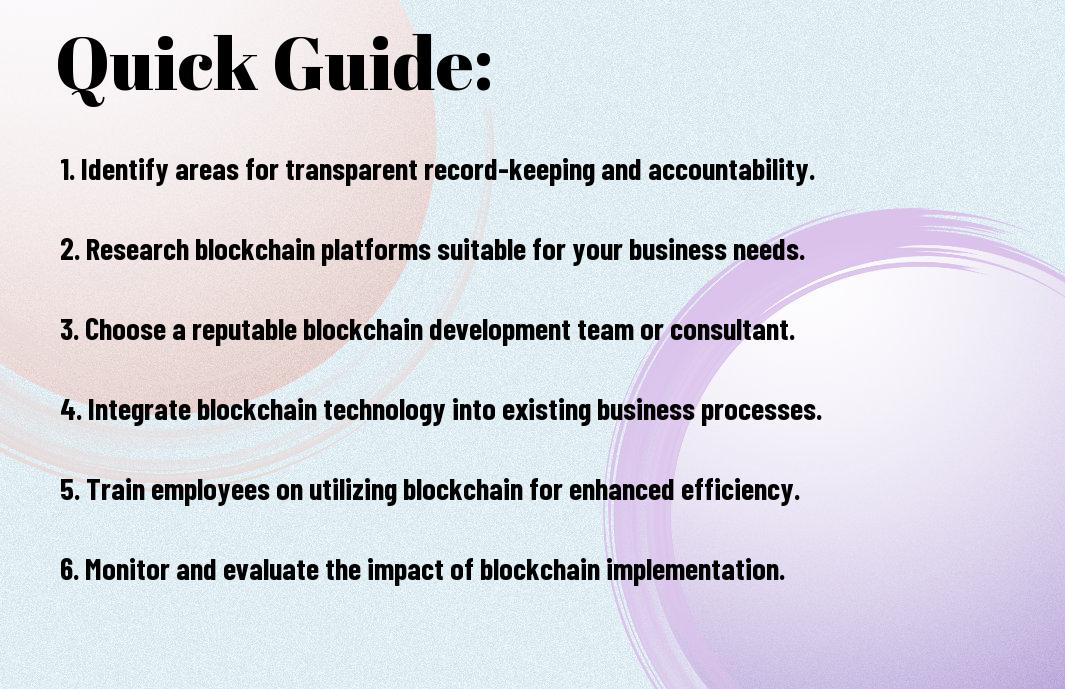Most businesses today can benefit from integrating blockchain technology into their operations. This innovative technology offers a secure, transparent, and efficient way to manage transactions and data within your organization. By leveraging blockchain, you can improve trust with customers, streamline processes, and reduce costs. Want to learn more about the 7 Uses for Blockchain Businesses? Keep reading to discover how you can harness the power of blockchain for your business.

Understanding the Basics
There’s a lot to unpack when it comes to understanding the basics of blockchain technology. From its decentralized nature to its immutability, grasping how blockchain works is crucial for any business looking to incorporate this revolutionary technology into their operations.
Types of Blockchain Technology
There’s no one-size-fits-all approach when it comes to blockchain technology. Understanding the different types is crucial for implementing the right solution for your business needs. The most common types include public blockchains, private blockchains, consortium blockchains, and hybrid blockchains. Each has its own set of characteristics and use cases, so it’s important to choose wisely. After, you’ll have a clearer picture of which type best suits your business requirements.
| Public Blockchains | Accessible to anyone and everyone, offering transparency and security. |
| Private Blockchains | Operated by a single entity, providing control over permissions and data. |
| Consortium Blockchains | Shared among a group of organizations, allowing for a more controlled environment. |
| Hybrid Blockchains | Combination of public and private blockchains, offering flexibility and security options. |
| After | Understanding the different types of blockchain technology will help you make an informed decision for your business. |
How Blockchain Can Revolutionize Different Industries
For businesses, the potential of blockchain technology to revolutionize various industries is immense. From supply chain management to finance, healthcare to real estate, blockchain offers increased security, transparency, and efficiency. With its ability to create tamper-proof records and streamline processes, blockchain has the power to transform the way businesses operate in numerous sectors.
With blockchain, industries can benefit from secure and transparent transactions, reduced costs through eliminating intermediaries, and improved efficiency by automating processes. Implementing blockchain technology can revolutionize how data is managed and transactions are conducted across various sectors, paving the way for a more innovative and trustworthy business environment.

Step-by-Step Guide to Implementing Blockchain
Identify Potential Use Cases
Step-by-Step, the first task is to identify potential use cases for blockchain in your business. Consider where transparency, security, and decentralization could bring value. Whether it’s supply chain management, data verification, or smart contracts, potential use cases are key to leveraging blockchain technology effectively.
Developing a Blockchain Strategy
Little by little, developing a blockchain strategy is crucial. Start by setting clear goals and objectives for implementing blockchain in your business operations. Consider the scalability, interoperability, and regulatory considerations in your strategy to ensure a successful implementation.
Potential pitfalls in developing a blockchain strategy include overlooking the importance of network security and not aligning the technology with your business processes. However, the positive outcomes of a well-thought-out strategy can lead to increased efficiency, improved transparency, and better customer trust.
Practical Tips for Blockchain Integration
Once again, if you are considering Blockchain integration in your business, here are some practical tips to help you navigate the process smoothly:
Factors to Consider Before Adoption
- Assess your business needs and goals to determine the suitability of Blockchain technology.
- Evaluate the scalability and security features of different Blockchain platforms.
- Consider the regulatory requirements and compliance issues in your industry.
- Allocate sufficient resources for training and development to ensure successful implementation.
This will help you make an informed decision and avoid potential pitfalls in the integration process.
Pros and Cons of Using Blockchain in Business
| Pros | Cons |
| Improved transparency and traceability. | High initial setup costs. |
| Enhanced security and immutability of data. | Scalability challenges for large networks. |
| Streamlined efficiency and reduced transaction costs. | Complexity of smart contracts and governance. |
Tips: When weighing the pros and cons of using Blockchain in your business, consider factors such as security, efficiency, and cost-effectiveness. It is important to conduct a thorough analysis to determine if the benefits outweigh the challenges.
Factors: It’s important to understand that while Blockchain offers numerous advantages such as improved security and transparency, there are also potential drawbacks such as high setup costs and scalability challenges. Perceiving the balance between these factors is crucial for successful integration.
Nurturing Blockchain Development in Your Company
Training Your Team for Blockchain
For successful implementation of blockchain technology in your business, it’s crucial to invest in training your team. While blockchain has the potential to revolutionize your operations, it requires a deep understanding to leverage its full benefits. Providing your employees with the necessary knowledge and skills will empower them to effectively navigate the complexities of blockchain technology and implement solutions tailored to your business needs.
Staying Ahead with Ongoing Innovations
While getting your team up to speed is imperative, it’s also vital to stay ahead of ongoing innovations in the blockchain space. Little changes and advancements occur rapidly in this field, and being proactive in adopting new technologies and strategies will give your company a competitive edge. Understanding and embracing emerging trends will position your business as a leader in the industry, enhancing your reputation and attracting new opportunities.
Understanding the latest developments and trends in blockchain technology is key to harnessing its full potential for your business. Staying informed about advancements can help you identify new opportunities and stay competitive in a rapidly evolving industry. However, it’s important to proceed with caution and ensure that any new innovations align with your business goals and values.
Final Words
Taking this into account, integrating blockchain technology into your business can streamline operations, increase transparency, and bolster security. By leveraging distributed ledger technology, you can enhance trust among stakeholders, reduce costs, and revolutionize traditional processes. Embracing blockchain opens up new possibilities for innovation and efficiency, paving the way for a brighter future for your business. As the technology continues to evolve and gain widespread acceptance, now is the perfect time to explore its potential applications in your industry. By staying informed, collaborating with experts, and creatively implementing blockchain solutions, you can stay ahead of the curve and position your business for long-term success in the digital era.
FAQ
Q: What is Blockchain technology?
A: Blockchain technology is a decentralized and distributed digital ledger that records transactions across many computers in such a way that the registered transactions cannot be altered retroactively.
Q: How can Blockchain technology benefit my business?
A: Blockchain technology can benefit your business by enhancing security, increasing transparency, reducing costs, improving efficiency, and enabling faster transactions.
Q: How can I implement Blockchain technology in my business?
A: To implement Blockchain technology in your business, you can start by identifying areas where the technology can add value, choosing the right Blockchain platform, developing a proof of concept, and collaborating with experts in the field.
